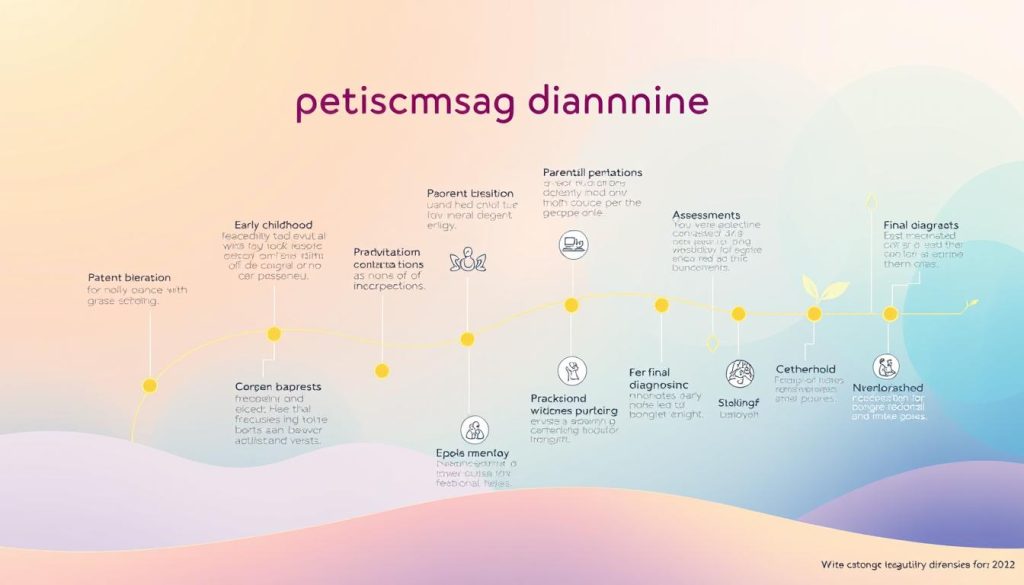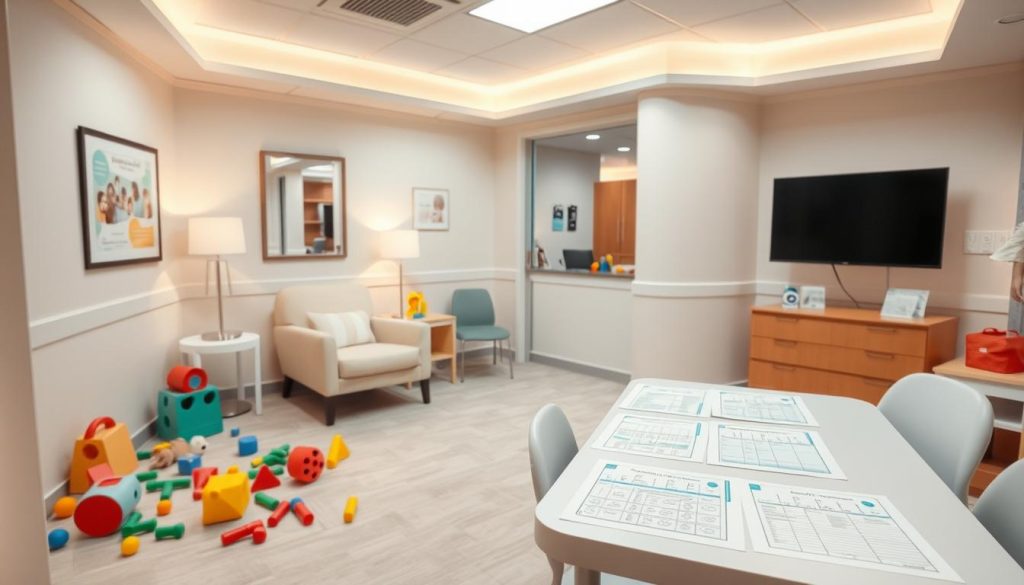Wondering how to get autism diagnosed? The process can seem scary, but it’s key to getting help. Early detection helps get the right support and treatments.
Getting an autism diagnosis has several steps. You’ll first notice signs and then get professional checks. This guide will help you understand the journey to a proper diagnosis and support.
Understanding the autism diagnosis process is empowering. It helps you take action for yourself or a loved one. Let’s look at how to get diagnosed and why professional help is important.
Understanding Autism Spectrum Disorder (ASD) Basics
Autism Spectrum Disorder (ASD) is a complex condition that affects how people interact and learn. It can be identified through an evaluation. This helps spot signs in both adults and children. Let’s dive into the main points of ASD.
Common Characteristics and Traits
People with ASD often show unique behaviors. They might struggle with social interactions, repeat actions, or have intense interests. Spotting autism in adults can be tricky.
- Trouble understanding social cues
- Difficulty maintaining eye contact
- Repetitive movements or speech patterns
- Sensitivity to sensory stimuli
- Strong adherence to routines
Different Types of Autism Spectrum Disorders
ASD now includes various conditions once diagnosed separately. An evaluation considers them all as part of a spectrum:
| Former Diagnosis | Characteristics |
|---|---|
| Autistic Disorder | Significant language delays, social challenges, unusual behaviors |
| Asperger’s Syndrome | Average or above-average intelligence, social difficulties |
| PDD-NOS | Atypical autism, milder symptoms |
Myths and Facts About Autism
There are many misconceptions about ASD. It’s important to know the truth:
- Myth: Autism is caused by vaccines
- Fact: There’s no scientific proof linking vaccines to autism
- Myth: People with autism lack empathy
- Fact: They may show empathy in different ways
- Myth: Autism only affects children
- Fact: It’s a lifelong condition, and adults can show signs too
Knowing these basics is key for those seeking an evaluation or looking for signs in adults. Early recognition and support are vital for a better life with ASD.
Recognizing Early Signs and Symptoms of Autism
Spotting autism in adults and kids is key for early help. Adult signs can be hard to see. Let’s look at important signs that might mean someone has autism spectrum disorder (ASD).

People with ASD often find social interactions tough. They might have trouble keeping eye contact or understanding facial expressions. Talking can feel one-sided, with issues in sharing or taking turns.
Communication can be different too. Some adults with autism speak in a flat tone or struggle with figurative language. They might take words too literally or miss sarcasm and jokes.
- Repetitive behaviors or rituals
- Intense focus on specific topics
- Sensitivity to sensory stimuli
- Difficulty adapting to changes in routine
Adults with autism might find it hard to make and keep friends. They might prefer being alone or struggle with social rules. Some do well in jobs that need detail but find it hard to do many things at once.
It’s vital to remember that autism signs can vary a lot. If you see these traits in yourself or someone you care about, getting a professional check is a good idea.
How Do I Get Autism Diagnosed: First Steps to Take
Getting an official autism diagnosis starts with taking proactive steps. This process involves self-assessment, gathering important documents, and finding an autism specialist. Let’s explore these initial stages to help you navigate the path towards a diagnosis.
Self-Assessment Tools and Resources
Start by using online self-assessment tools. These tools can give you insights into your symptoms and behaviors. They are not a substitute for a professional diagnosis but can help start conversations with healthcare providers.
- Autism Spectrum Quotient (AQ) Test
- RAADS-R (Ritvo Autism Asperger Diagnostic Scale-Revised)
- Autism-Spectrum Quotient (AQ) for Adults
Documentation to Gather Before Seeking Diagnosis
Before seeking a formal evaluation, prepare a detailed file of relevant information. This preparation can make the diagnostic process smoother and provide valuable context for healthcare professionals.
| Document Type | Importance |
|---|---|
| Medical History | Provides background on overall health |
| School Records | Shows academic performance and behavioral notes |
| Employment History | Illustrates work-related challenges or successes |
| Personal Observations | Offers insights into daily life experiences |
Finding the Right Healthcare Provider
Finding a qualified autism specialist is key for an accurate diagnosis. Look for local providers who specialize in autism spectrum disorders. Consider their experience, credentials, and patient reviews. Don’t hesitate to ask about their diagnostic approach and experience with adult autism.
The Professional Autism Assessment Process
The autism diagnosis process has several steps. It looks at behavior, communication, and developmental history. This detailed method helps get an accurate diagnosis.

First, a detailed medical history and concerns are reviewed. Healthcare providers might use screening tools to spot autism signs. These tools help decide if a deeper check is needed.
If more assessment is required, a team of experts gets involved. This team includes psychologists, speech therapists, and occupational therapists. Each brings their own skills to the diagnosis.
- Psychologists check cognitive and social skills
- Speech therapists look at communication
- Occupational therapists examine motor skills and sensory sensitivities
During the evaluation, specialists watch the individual’s behavior in different settings. They use tests to measure skills and abilities. Parents or caregivers fill out questionnaires about the person’s growth.
After collecting all the data, the team reviews it together. They compare it to autism spectrum disorder criteria. This teamwork ensures a precise and complete diagnosis.
Types of Diagnostic Tests and Evaluations
Autism assessment tests are key in diagnosing autism spectrum disorder (ASD). They check behavior, thinking skills, and health. This helps figure out if someone meets autism’s diagnostic criteria.
Behavioral Assessments
Behavioral assessments are vital for autism diagnosis. They look at how a person acts, interacts, and communicates. Some common tests include:
- Autism Diagnostic Observation Schedule (ADOS)
- Childhood Autism Rating Scale (CARS)
- Social Communication Questionnaire (SCQ)
Cognitive Testing Methods
Cognitive tests check thinking skills and learning ways. They find out what a person is good at and what they struggle with. Some tests for autism are:
- Wechsler Intelligence Scale for Children (WISC)
- Kaufman Brief Intelligence Test (KBIT)
- Vineland Adaptive Behavior Scales
Medical Examinations
Medical exams are important to check for other conditions and health. They might include:
- Hearing and vision tests
- Genetic testing
- Neurological exams
| Test Type | Purpose | Examples |
|---|---|---|
| Behavioral | Assess social interaction and communication | ADOS, CARS, SCQ |
| Cognitive | Evaluate intellectual abilities and learning styles | WISC, KBIT, Vineland |
| Medical | Rule out other conditions and assess overall health | Hearing tests, genetic testing, neurological exams |
Cost Considerations and Insurance Coverage
Getting an official autism diagnosis can be expensive. The cost depends on the assessments needed and the healthcare providers. Families often struggle with insurance policies to find out what’s covered.

Autism evaluations can cost between $1,000 and $5,000. This includes many appointments, tests, and assessments. Some may need to pay extra for special evaluations or more appointments.
Insurance coverage for autism diagnosis varies a lot. Many plans now cover autism services, but the details differ. It’s important to talk to your insurance provider to know what you’ll pay out of pocket.
| Service | Estimated Cost | Typical Insurance Coverage |
|---|---|---|
| Initial Consultation | $200 – $500 | Often Covered |
| Comprehensive Evaluation | $1,500 – $3,000 | Partially Covered |
| Specialized Assessments | $500 – $1,500 | Coverage Varies |
| Follow-up Appointments | $100 – $300 per visit | Often Covered |
If you’re worried about the cost, there are options. Some clinics offer fees based on your income. State programs and non-profits might also help with the cost of autism evaluations. It’s worth looking into these resources to help with the expenses.
Adult Autism Diagnosis: Special Considerations
Getting diagnosed with autism as an adult can change your life. Many adults find out they have autism later, facing unique challenges and chances. Understanding adult autism symptoms and getting a diagnosis can bring clarity and support.
Late-Life Diagnosis Challenges
Adults facing an autism diagnosis often face hurdles. Years of hiding symptoms and finding ways to cope can make it hard to see signs of autism. Some challenges include:
- Limited awareness among healthcare providers about adult autism
- Difficulty recalling childhood experiences
- Overlap of symptoms with other conditions
- Stigma or self-doubt about seeking diagnosis
Benefits of Adult Diagnosis
Despite challenges, an autism diagnosis as an adult can be very beneficial. It can lead to:
| Benefit | Impact |
|---|---|
| Self-understanding | Explains lifelong struggles and differences |
| Access to support | Opens doors to autism-specific resources |
| Improved relationships | Helps loved ones understand communication needs |
| Workplace accommodations | Allows for better job performance and satisfaction |
Recognizing adult autism symptoms and seeking diagnosis can improve your life. It lets you embrace your unique strengths and find ways to handle challenges. Whether you’re noticing signs of autism in adults or questioning your own experiences, exploring diagnosis can be a powerful step towards self-discovery and support.
Pediatric Autism Diagnosis Timeline
Understanding the autism diagnosis process for children is key for parents. The timeline for getting a diagnosis can vary. But knowing what to expect helps families on this journey.

Early detection is vital. Parents often notice signs as early as 12-18 months. These signs include delayed speech, lack of eye contact, or repetitive behaviors. If you see these signs, it’s time to ask, “How do I get autism diagnosed for my child?”
Talking to your pediatrician is the first step. They’ll do initial screenings and may refer you to specialists. This usually happens around 18-24 months. Then, more detailed evaluations follow, usually between ages 2-3.
| Age | Milestone in Diagnosis Process |
|---|---|
| 12-18 months | Early signs may appear |
| 18-24 months | Initial pediatric screening |
| 2-3 years | Comprehensive evaluation |
| 3-5 years | Ongoing assessments and interventions |
The diagnosis process involves many specialists. These include psychologists, speech therapists, and occupational therapists. They use tools and observations to diagnose. This can take several months.
After diagnosis, the focus shifts to intervention. Early intervention services start between ages 3-5. Remember, each child’s journey is unique. Some may get diagnosed earlier or later than others.
Being informed and proactive is essential. If you’re wondering how to get autism diagnosed, start by documenting your concerns and seeking professional advice. Early action can significantly impact your child’s development and support. Learn more about autism and its impact on mental health to better understand your child’s needs.
Choosing the Right Diagnostic Center
Finding an autism specialist is key to getting a correct diagnosis. When searching for a center for an autism spectrum disorder evaluation, research and ask important questions.
Questions to Ask Possible Providers
Before you schedule an evaluation, consider these questions:
- What are your qualifications and experience in diagnosing autism?
- How long does the evaluation process usually take?
- What specific tests or assessments do you use?
- Will you provide a detailed written report of the evaluation?
- Do you offer follow-up services or referrals after diagnosis?
Red Flags to Watch For
Be careful of providers who:
- Promise quick diagnoses without thorough assessments
- Refuse to answer questions about their methods or qualifications
- Push expensive treatments or cures
- Lack proper credentials or licensing
- Don’t involve parents or caregivers in the evaluation process
A reputable autism specialist will answer your questions and keep you involved. Trust your instincts and get a second opinion if something doesn’t feel right. The right diagnostic center will give a detailed, professional evaluation to understand your or your child’s needs.
What to Expect During Diagnostic Appointments
Getting ready for autism tests can help reduce stress. These tests check if someone meets autism’s criteria. They are detailed and might take several hours or need more than one visit.
Experts will do many tests during the appointment. These include:
- Behavioral observations
- Cognitive tests
- Language evaluations
- Sensory processing assessments
They will ask lots of questions about your past, current habits, and how you function daily. They might also look at your medical records, school reports, or past tests.

Parents or caregivers are very important in sharing information. They might fill out forms or talk in interviews. For adults, family or friends might be asked to share their views too.
The table below shows what you might see in autism diagnostic appointments:
| Assessment Type | Purpose | Duration |
|---|---|---|
| Clinical Interview | Gather developmental history | 60-90 minutes |
| Behavioral Observation | Assess social interaction and communication | 30-60 minutes |
| Cognitive Testing | Evaluate intellectual abilities | 45-90 minutes |
| Adaptive Functioning Assessment | Measure daily living skills | 30-45 minutes |
The aim of these meetings is to collect all the needed info for a correct diagnosis. Being truthful and open is key to a good outcome.
Understanding Your Diagnosis Results
Getting an official autism diagnosis can change your life. It’s important to understand your results to move forward. We’ll look at how to read clinical reports and what to do after you’re diagnosed.
Reading Clinical Reports
Clinical reports talk about autism spectrum disorder in specific ways. They mention the diagnostic criteria for autism, which might seem hard to understand at first. Look for these key points:
- Social communication difficulties
- Restricted or repetitive behaviors
- Sensory sensitivities
- Developmental history
Every report is different, showing your strengths and challenges. This helps you find support and grow.
Next Steps After Diagnosis
After your diagnosis, you might feel many emotions. It’s okay to take time to think about it. Here are some steps to take:
| Action | Benefit |
|---|---|
| Join support groups | Connect with others who share similar experiences |
| Explore therapy options | Develop coping strategies and life skills |
| Learn about accommodations | Improve daily life at work or school |
| Educate family and friends | Build a supportive network |
Your diagnosis is a chance to understand yourself better. Use it to ask for what you need and celebrate your unique view of the world.
Support Resources and Communities
Looking for an autism diagnosis or dealing with life after an autism evaluation? Finding support is key. Many resources and communities are ready to help individuals and families on their autism journey.
Online forums are great for connecting with others who get what you’re going through. Sites like Wrong Planet and Autism Forums have discussion boards. Here, you can ask questions, share stories, and get advice from those who’ve been there.
Local support groups offer face-to-face interactions. Look for meetings in your area through autism organizations or hospitals. These groups have educational workshops, social events, and help you make friends.
- Autism Society of America: Offers nationwide chapters and resources
- Autism Speaks: Provides toolkits, information, and support services
- GRASP: Focuses on support for adults on the autism spectrum
Don’t forget about professional support. Therapists who specialize in autism can help with coping and social skills. Occupational therapists work on daily living skills, and speech therapists help with communication.
Remember, you’re not alone. Use these resources to find the support you need. Whether you’re seeking an autism diagnosis or after an evaluation, help is available.
Legal Rights and Accommodations
After getting an official autism diagnosis, it’s key to know your legal rights and available accommodations. These protections cover education, employment, and healthcare. They ensure equal opportunities and support for those on the autism spectrum.
Educational Rights
In the U.S., students with autism have the right to a free and appropriate public education. The Individuals with Disabilities Education Act (IDEA) requires schools to offer special education services and accommodations. These can include individualized education programs (IEPs), assistive technology, and specialized instruction.
Workplace Accommodations
The Americans with Disabilities Act (ADA) protects individuals with autism from workplace discrimination. Employers must provide reasonable accommodations to help employees do their job. These can be things like modified work schedules or sensory-friendly workspaces.
Healthcare Access
Healthcare rights for those with autism include access to necessary treatments and therapies. The Affordable Care Act stops insurance companies from denying coverage for pre-existing conditions, including autism. Many states also require insurance to cover autism-related services.
| Area | Key Laws | Examples of Accommodations |
|---|---|---|
| Education | IDEA | IEPs, assistive technology, specialized instruction |
| Employment | ADA | Flexible schedules, sensory-friendly workspaces |
| Healthcare | ACA | Coverage for autism therapies, mental health services |
Knowing these rights is vital when living with autism. It helps individuals advocate for themselves and get the support they need. This way, they can thrive in different areas of life.
Building Your Support Team Post-Diagnosis
After seeking an autism diagnosis, it’s key to build a strong support team. This team will guide you through the journey. Let’s look at how to build your support network.
Begin by finding an autism specialist to lead your team. This expert will be the foundation. Then, add therapists, educators, and medical professionals who know autism well.
Think about these important team members:
- Behavioral therapist
- Speech-language pathologist
- Occupational therapist
- Special education teacher
- Pediatrician with autism experience
When picking team members, look for those with the right experience and skills. Ask about their autism care approach and how they work with others.
| Team Member | Role | Importance |
|---|---|---|
| Autism Specialist | Coordinates overall care | High |
| Behavioral Therapist | Develops behavior strategies | High |
| Speech Therapist | Improves communication skills | Medium to High |
| Occupational Therapist | Enhances daily living skills | Medium |
| Special Educator | Adapts learning strategies | High |
Your support team should work well together. Regular meetings and open communication are key. This ensures everyone supports your loved one with autism.
Conclusion: Embracing Your Autism Diagnosis
Getting an autism diagnosis can change your life. If you’re wondering how to get diagnosed or need an evaluation, it’s about understanding yourself. The journey might seem tough, but it’s a step towards learning more about yourself.
Your diagnosis is not just a label. It’s a way to find support and resources. It helps you understand your past and make better choices for the future. Use this knowledge to stand up for yourself in school, work, and healthcare.
Building a strong support network is key. Find autism communities, professionals who get you, and people who celebrate your strengths. Remember, your diagnosis doesn’t define you. It helps you understand and nurture your true self.
FAQ
Q: How do I start the process of getting diagnosed with autism?
A: Start by talking to your doctor about your concerns. They can do an initial check and send you to a specialist. You can also use online tools to learn more before you see a professional.
Q: What are some common signs of autism in adults?
A: Adults with autism might struggle with social interactions and understanding nonverbal cues. They might also have repetitive behaviors, intense interests, and be sensitive to certain sounds or sights. But, everyone’s symptoms are different.
Q: How long does the autism diagnosis process typically take?
A: Getting diagnosed can take a few weeks to several months. It involves many appointments and tests. The time it takes can depend on your age, symptoms, and how easy it is to find specialists.
Q: What types of professionals are involved in autism diagnosis?
A: A team of experts usually helps diagnose autism. This team might include psychologists, psychiatrists, and therapists. The specific team members depend on your age and needs.
Q: Are there specific tests used to diagnose autism?
A: Yes, there are tests like the Autism Diagnostic Observation Schedule (ADOS) and the Autism Diagnostic Interview-Revised (ADI-R). There are also tests for thinking and language skills. The tests used can change based on your age and situation.
Q: How much does an autism evaluation typically cost?
A: The cost of an autism evaluation can vary a lot. It can be a few hundred to several thousand dollars. Many insurance plans help cover the cost. It’s a good idea to check with your insurance and the places that do evaluations for specific prices.
Q: Can autism be diagnosed in adulthood?
A: Yes, autism can be diagnosed in adulthood. While it’s often found in children, many adults get diagnosed later. Getting diagnosed as an adult can help you understand yourself better and find support.
Q: What should I bring to my autism evaluation appointment?
A: Bring any important medical or school records to your appointment. Also, make a list of your concerns and questions. It’s helpful to have a friend or family member with you for support.
Q: How can I find a qualified autism specialist in my area?
A: Ask your doctor for recommendations to find a specialist. You can also contact autism organizations or use online directories from groups like the Autism Society of America.
Q: What are the benefits of getting an official autism diagnosis?
A: Getting a diagnosis can open doors to support services and educational help. It can also help you understand yourself better and connect with others who have autism. For some, it’s a way to explain lifelong challenges and find validation.


















